- Home
- Lise McClendon
Painted Truth Page 19
Painted Truth Read online
Page 19
“I wonder who that guy was.”
“What guy?”
“The guy in the fire.”
The agent stepped into the closet, his polyester navy jacket with the gold button still immaculate. My closet was a small walk-in, not as big as Eden’s. I plucked the postcard from Ray’s off the mirror and read it again. The picture on the back featured a cowboy in midair on a bucking horse, and read: National Finals Rodeo.
“I’m thinking,” I continued, wedging the postcard back on the mirror, “that whoever killed that guy in the fire, shot him up with drugs and left him to burn, also killed Ray Tantro. It’s just too coincidental.”
“I don’t believe in coincidence,” his muffled reply came from behind my coats. He was going through pockets and feeling up linings.
“So are you guys looking into the fire? Because it’s got to be connected.”
The agent emerged, hair askew, almost looking like a real person. His sandy hair didn’t have gray yet. He had a kinder, more open face than Newberg, but not a friendly face. I imagined he had been friendly once but had learned to hide it, to be tough, to be manly, to be FBI.
He turned to the other side, patting down rain jackets and summer slacks. “It’s a jurisdictional thing, Miss Thorssen.”
“You can call me Alix. And your name is—?”
As if to answer, Newberg’s voice boomed from the hallway. “Singleton?!”
Singleton nearly jumped out of the closet, pushing me gently aside. Wine sloshed onto my shirt.
They were mumbling to each other by the front door as I came out, wiping my shirt with a hand towel from the bathroom. Newberg saw me and turned, suddenly gallant.
“Miss Thorssen. We’re finished here. Thank you for your cooperation.”
I tried to read their faces, see what they had found.
“We’ll just be seeing how Agent Munro did downstairs, then we’ll be gone,” Newberg said, opening the door. Singleton was smoothing his hair as he disappeared into the hallway.
“Wait a minute,” I protested. “I’ve been very cooperative here. A lot more than most people would it you started going through their personal stuff. I think you owe me an explanation. Am I going to be charged with something?”
Newberg hesitated, his hand still on the doorknob. We could hear Singleton and Munro downstairs, talking.
“We can’t discuss that at this time. We’ll be in touch,” Newberg said.
It was nine o’clock. I stood, confused, tired, hungry, listening to their footsteps on the wood floor below. Their voices were low, indistinguishable. They talked for five minutes, then let themselves out.
After going down to bolt the door and douse the lights, I tackled the mess they’d left. It wasn’t much really, but I wanted to eradicate every reminder of their intrusion. Suddenly I was angry, zipping back on the slipcovers, patting down the cushions, straightening picture frames. Newberg had taken all my vintage Mighty Thor comic books out of their plastic sleeves, leaving the sleeves stacked next to the case. He had put the comics back haphazardly in a pile on the shelf.
The phone rang. I glared at the bookcase as I moved to answer it. Paolo again. “Are they still there?” His voice held the kind of strained excitement that people get from brushes with the law. I assured him they had left. “Can I bring over some beans and rice? Have you eaten?”
“No, I mean, yes, bring them over.” I could use the company now, neutral company. Someone I could shout at if necessary. One tried to restrain oneself in the presence of the high-and-mighty FBI, even if one was only partially successful. I unlocked the back door for Paolo, then sat in front of the bookcase putting the Mighty Thors back in chronological order. As often happens, I began to read the comics again, savoring the plights of my hero, the Thunder God. Reading of attacks by mutants and double-crossing friends of the superhero made my woes seem more manageable.
Paolo trudged up the stairs with a big soup pot in his hands, his face flushed. “What did they do? It doesn’t look like they were even in here.”
“Don’t sound so disappointed,” I said, still sitting on the floor against the case with three comic books on my knees. “They weren’t too vicious.”
As he set the pot on the kitchen counter and got out some bowls, I got up and set the table. Paolo searched my face with his black eyes. “Are you okay? Did they hurt you or anything?”
I shook my head. “It was just a search warrant. Not a license to shake me down.”
“Then why are you frowning like that?”
I sat at the table in front of the bowl of steaming black beans and rice. “I’m afraid if I was them I’d be arresting me tomorrow morning, no matter what I found in my apartment.”
“What?”
“Never mind. Just make sure you don’t have plans for the week.” I felt terrible, as if the bump on my head had taken out all my fire. As if I had nothing to do but await the inevitable.
“You’re not serious?” Paolo asked, sitting opposite me.
“I might be.”
We ate in silence. Paolo’s bean dish was warm and comforting. I wondered how many more times I would eat his mother’s famous recipe from Argentina with the hint of anise and hard-charging hot peppers. I thought of asking for the recipe, but that would mean talking about his leaving and I couldn’t bear that right now. I skirted the issue by bringing up his chosen successor.
“Have you talked to Eden?” I asked.
“This morning she came in. She was with Pete.” He straightened, remembering. “Did Wally say he’d sell Gloria?”
“Probably. He had his ninth kid today, while I was there.”
“Nine kids? He can use the money, then.”
I shrugged. We had never really talked about Eden as my partner. Thoughts of Paolo’s leaving, Eden’s betrayal, Carl’s disappearance, Martin’s sale, Newberg’s steely eyes, all swirled in my head, heavy as molten lead.
Paolo was still fixated on the Tantro. “We would charge him a fee, maybe a little discount since we don’t have any agreement, eh? He’ll go for that, no? He’ll be making, what, twenty-two, twenty-three? What do you think? Ten percent?”
“Sounds fair.” Wally probably would balk, but the money would offset his misgivings.
We finished dinner and stacked the dishes in the sink. Paolo was high with anticipation of the big sale and dragged me downstairs to look at the painting again. On the way I grabbed my old Tantro off my desk. I had never looked at it side by side with the big canvases. The comparison would probably not be favorable to my little snow scene, but I wanted to see how it held up.
Paolo held a glass of wine by his shoulder, standing back with the spotlights on Gloria, admiring her. I had held out for ice water. The meal had helped my fatigue, but another glass of wine would have done me in. I sat at Paolo’s desk, laying the small painting in front of me.
Gloria was a curious piece for Tantro but in many ways the best thing he’d ever done. It was the painting I would most want to have in my collection had twenty-five grand come my way. The winter scene was executed with an impressionistic grace that made you feel both the biting prairie wind and the blessed blanket of warmth made by a deep, slumbering snowfall. The trees were stoic reminders of summer, of hope, and the frozen river promised tadpoles and roe. It was a vision of sleep, renewal, seasons, yearning, and trust.
“Magnificent,” Paolo said. “The best piece we have ever had, don’t you agree?”
“The other two aren’t shabby either,” I said. On their own they too were magnificent.
I picked up my junior Tantro and walked around to the wall where the three huge canvases hung. It fit in the space between Gloria and Field at Noon, almost scraping their stretched-canvas sides with its old green frame. I held it at arm’s length, trying to back up to look at all the works. Paolo went into the back room, returning with hammer and nail. In a moment my small piece hung like a comma in a sentence of bold statements. I stood back with Paolo and silently compared.
; The size, of course, was the first thing you saw. It was hard to get past that. The scope of the bigger works was so vast, an orchestra of color and light. By comparison the little piece was a single violin, sweet and demure but simply too tiny to make an impact
“When did you get your little one?” Paolo asked, squinting at the signature and date in the lower right-hand corner.
“I’ve been trying to remember. Either in ‘75, or the next summer. I came home to visit and my mom took me to a bunch of galleries.”
“It must have been cheap,” he said, not unkindly.
“I came into my trust that summer. From my father. For me it wasn’t cheap.” I remembered suddenly the elation, then the grief and guilt I had felt about the trust, my last tangible connection with my father. He had died six years before, six miserable teenage years. I considered myself an adult in 1975, but dealing with his death all over again was a struggle. I could still feel the weight of his loss deep in my bones.
“It got you to New York, right? Your dad’s money.”
“Right.” I smiled at Paolo. He put his arm around me suddenly as if he too was remembering those New York days when we fell in love. He gave my shoulder a little squeeze.
“And it made you an investment. A good investment.” Paolo took the small piece off the wall and looked at the back. “Memory of Winter” he read aloud, placing it back on the nail.
“I didn’t buy it for an investment.”
“No matter.” He shrugged. “It was a good one.”
I bent down and stared at the thick paint strokes of my piece. Then I moved to Gloria, squinting. Then back. A painting looks so different up close, like the cells of the body that when isolated appear to have so little relevance to the whole. I put my nose up to the little Tantro again, frowning.
“What?” Paolo said behind me. “What is it?”
“I don’t know. Take a look at this.” I pointed to a small area on the right side of Memory. “At the snow here.”
Paolo moved close. The snow was white in that spot on my painting, tinged with violet. There was a layer of dust on it made more visible because I had rubbed a spot with my fingertip.
“Now here.” I pointed to a similar snow bank on Gloria. He leaned into it. “See the difference?”
He looked back and forth. The snow on the big canvas held an odd green tint. For them to be identical would have been unusual. “What?” he said, stepping back. “Yours is dirtier.”
“Not the dirt. They’ve been stored differently. Something else. The quality of the paint.”
Paolo almost touched his nose to my piece, then leaned out, raising his eyebrows. “Cracks.”
Where I had rubbed Memory of Winter distinct hairline cracks showed up, now lined with the dust I had pressed into them. I wet my finger on my tongue and smeared my spit on the whitest part of the snow. More cracks, deep ones.
Paolo waved his arm at Gloria. “No cracks.”
“Nothing like mine.” I looked at him. “What does it mean?”
Paolo was examining the other two canvases, then stood back, scratching his chin. “There is something about the colors in these big ones. They don’t match yours.”
“So he bought new paints. What does that prove? Why would some paints crack and not others? It’s just the white.”
‘There used to be a white paint. I remember one of Ramon’s artists used it,” he said, referring to the owner of the gallery where he had worked. “This guy did a big series for Ramon. Lots of red, white, and blue stripes. All the white stripes did this.” He pointed at the cracks in Memory. “Ramon had a fit.”
“Just the white?”
“A quick-drying white. The artist tried to cut corners, get more stuff done. You know how long it takes for oils to dry. The thick ones can take months.”
“Even a year,” I said.
“Yes. But Ramon made him do them all over. He was a stickler for quality.” Paolo examined all the paintings up close yet again. “The greens are different too. That could be explained, I suppose. But artists get used to mixing certain ways. Especially when they are working on a cycle that is similar of subject, of style. The subject matter is the same in the big ones and the little. The big three all have similar greens. And pinks. And the style, the strokes, is the same.”
The greens of the big canvases were muddy, whereas on my piece the greens had a marine blue touch to them. There wasn’t much pink in my little piece, but what was there had an orange cast. In the big paintings a truer pink, streaked with red, showed through.
I didn’t want to believe this. A shiver edged up my bruised spine. It couldn’t be true. These had to be Tantros. They were his legacy, his gift. They had to be authentic.
Paolo kneeled by Winter Glass, his hand on the lower left corner. “Look at this.”
I bent down. In a large clump of dark green paint, applied thickly with a wide palette knife, a fingerprint was now visible. Paolo’s fingerprint.
“It isn’t completely dry. Just on spots where the paint is very thick, but still. It isn’t dry.” Paolo stood up and brushed his hands together as if dismissing the whole thing. His handsome face was creased with disappointment. “They took that quick-drying white off the market in about ‘75. The big pieces were painted later, within the last year. I don’t care if they do say ‘74 on them. No way were they done at the same time as the small one. I stake my reputation on it.”
19
THE MOON SHONE an anorexic crescent directly overhead as I drove out of the sleeping town of Jackson. It was close to one-thirty by then, but sleep, for me, was not in the cards. The mountains rising on either side of the road as I headed west were thick and dark with twinkling spots of light at vacation homes. Traffic consisted of a loud carload of party-hardies and semis grinding gears as they approached the town.
Carl had called about eleven. He was halfway home. He had taken my advice and called his friend in the Crime Scene Unit about getting back onto the force. Anywhere but patrol work, he asked his friend. It turned out the captain had held up his resignation anyway, thinking he might change his mind after a good vacation. A couple hours later his friend called back and said it was set up. Carl wasted no time pointing his El Dorado north. He said just being around me made him realize how much he would miss police work, especially the detective part of it. I took that as a compliment.
I crossed the Snake River, dotted with gravel bars and stippled silver in the thin moonlight, then turned off toward Teton Village. I marveled again at the excitement in Carl’s voice. He had done the right thing, I told him. I wished him well. He said he was sorry about the things he said. I told him I wished I could have shown him a better time in Jackson. He promised to call soon.
The road to the ski area was lined with expensive resorts, condominiums, a fancy golf course, and shacks that ran half a mil. Interspersed between these developments were older residences, some elaborate, some not, tucked among the firs and aspens. I found the lane to Pete Rotondi’s place after slowing to a snail’s pace on the highway.
Five homes sat along the gravel drive. The first two, by the highway, were the oldest, cabins that had been revamped and expanded but were still small and funky. Pete’s was the last, nestled in the spruce and aspen trees. I parked the Saab near the drive and walked in the dark toward the house, around Pete’s car with the kayaks strapped on top. In the dark it looked like a giant dragonfly.
The kitchen light was on. I knocked lightly on the side door. The house was not large, a newer one-story with cedar siding. Berms were covered with flowers, the white phlox bright in the moonlight. A flagstone walk curved through the lawn to the small covered porch. Sage and thyme grew to one side of the kitchen stoop.
Eden’s face peered around the curtain, her brown curls in her eyes. She squinted at me, turned, and flicked on the overhead light.
“Alix. What are you doing out here? It’s so late.” She stepped back to let me in, looking after me to see that I was alone. She wore denim shorts
and a red sweater that was probably Pete’s. It hung almost to her knees.
“I have to talk to you, Eden.”
She moved to the stove where a teakettle sat waiting. “Would you like some tea? I was just about to have a cup.” I let her fuss with cups and tea bags until we were settled finally at the kitchen table. The kitchen had rustic pine cupboards and Mexican tile counters, very tasteful. The table and chairs were pine too, the ladder-backs sporting rush seats and plump flowered cushions.
“Nice place,” I said, admiring the botanical prints of carrots and cabbages above the table.
“The whole house is wonderful. You’d never think it, looking at Pete.” Eden smiled, lowering her guard a little. “He’s gone to bed. He’s guiding at six tomorrow.”
“So you two are hitting it off?”
Eden shrugged. “He’s been nice to me.”
Meaning, of course, nicer than some people. I sipped my tea, trying to discover how to grind information out of someone you had lost respect for. She seemed so vulnerable and alone, but I remembered the way she had used me. I held down the bad feelings as Eden’s small face brightened.
“I’ve got something for you. Wait here.” She disappeared down the dark hall, returning a moment later. “The new Mighty Thor. I already read, it so you keep it for your collection.”
She handed me the comic book and sat down. On the cover a large whiskered face glowered in a burst of yellow lightning. Under it read, “Odin… Awake!” Odin was proclaiming: “Thou Art Naught but a Mortal Impostor!!! Where is the True Thor?!”
“It’s close to the end for the guy who’s been posing as Thor,” she said.
“Mmm, yeah, the architect.” I opened the comic carefully, flipping to the “Tales of Asgard” in the back. It looked as if Odin had woken up grumpy and was out for Heimdall’s hide.
“Right. Nobody knows what happened to the real Thor. Not even the impostor.” Eden leaned over her tea, letting the steam caress her face. She looked tired, closing her eyes. “Remember way back when that other guy was Thor for a while? That lame doctor? Thor has had lots of impostors over the years. What do the Norse gods call them?”

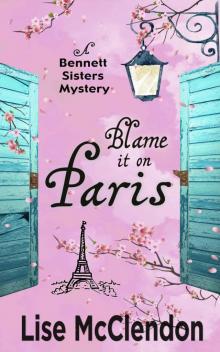 Blame it on Paris (Bennett Sisters Mysteries Book 7)
Blame it on Paris (Bennett Sisters Mysteries Book 7)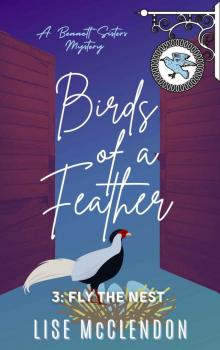 Birds of a Feather: 3: Fly the Nest (Bennett Sisters Mysteries Book 16)
Birds of a Feather: 3: Fly the Nest (Bennett Sisters Mysteries Book 16)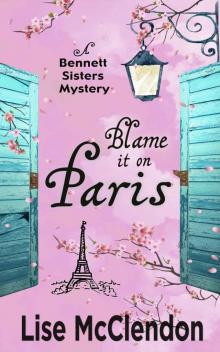 Blame it on Paris
Blame it on Paris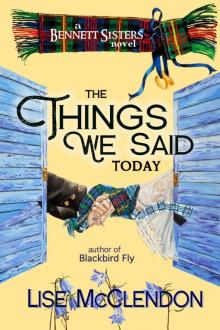 The Things We Said Today
The Things We Said Today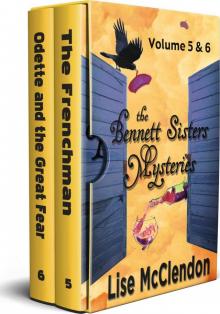 Bennett Sisters Mysteries Volume 5 & 6
Bennett Sisters Mysteries Volume 5 & 6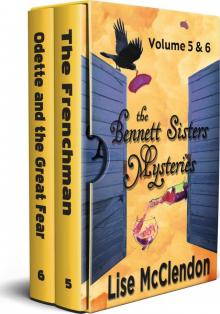 Bennett Sisters Mysteries Box Set 2
Bennett Sisters Mysteries Box Set 2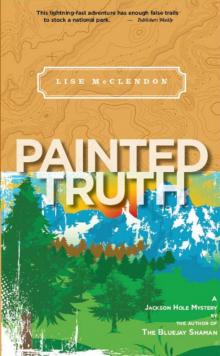 Painted Truth
Painted Truth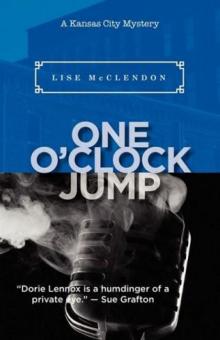 One O'Clock Jump
One O'Clock Jump The Bluejay Shaman (Alix Thorssen Mystery Series)
The Bluejay Shaman (Alix Thorssen Mystery Series) Swing Town Mysteries Dorie Lennox Box Set
Swing Town Mysteries Dorie Lennox Box Set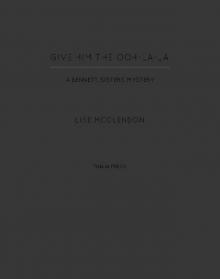 Give Him the Ooh-la-la
Give Him the Ooh-la-la Blackbird Fly
Blackbird Fly All Your Pretty Dreams
All Your Pretty Dreams Nordic Nights (The Alix Thorssen Mysteries)
Nordic Nights (The Alix Thorssen Mysteries)